2019版小升初英语时态专项复习:知识梳理、真题及练习(14页,含答案)
小升初英语四大时态复习讲解及真题专项练习含答案
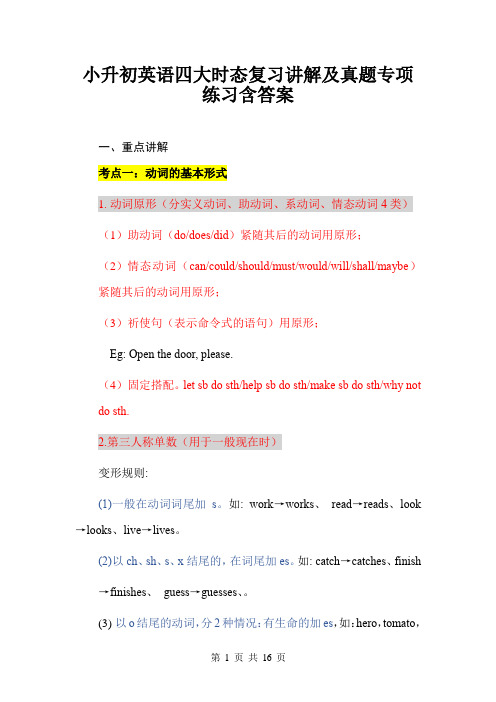
小升初英语四大时态复习讲解及真题专项练习含答案一、重点讲解考点一:动词的基本形式1.动词原形(分实义动词、助动词、系动词、情态动词4类)(1)助动词(do/does/did)紧随其后的动词用原形;(2)情态动词(can/could/should/must/would/will/shall/maybe)紧随其后的动词用原形;(3)祈使句(表示命令式的语句)用原形;Eg: Open the door, please.(4)固定搭配。
let sb do sth/help sb do sth/make sb do sth/why not do sth.2.第三人称单数(用于一般现在时)变形规则:(1)一般在动词词尾加s。
如: work→works、read→reads、look →looks、live→lives。
(2)以ch、sh、s、x结尾的,在词尾加es。
如: catch→catches、finish→finishes、guess→guesses、。
(3)以o结尾的动词,分2种情况:有生命的加es,如:hero,tomato,potato;没有生命的加s,如:radio,photo。
(4)以辅音字母加y结尾的动词,变y为ies。
如: fly→flies、study →studies、carry→carries.(5) 不规则变化。
如: have→has ,are→is,were→was3.现在分词(用于现在进行时)变形规则:(1)一般在动词后加ing。
如: work→working、read→reading、look →looking、wait→waiting。
(2)以不发音的e结尾的动词,去掉e,再加ing。
如: smile→smiling、move→moving、take→taking、write→writing。
(3)以重读闭音节结尾的且词尾只有一个辅音字母的,双写这个辅音字母加ing。
如: sit→sitting、stop→stopping、cut→cutting、run →running、swim→swimming.(4)少数几个以ie结尾的动词,将ie改为y加ing。
小升初英语时态专项复习及答案
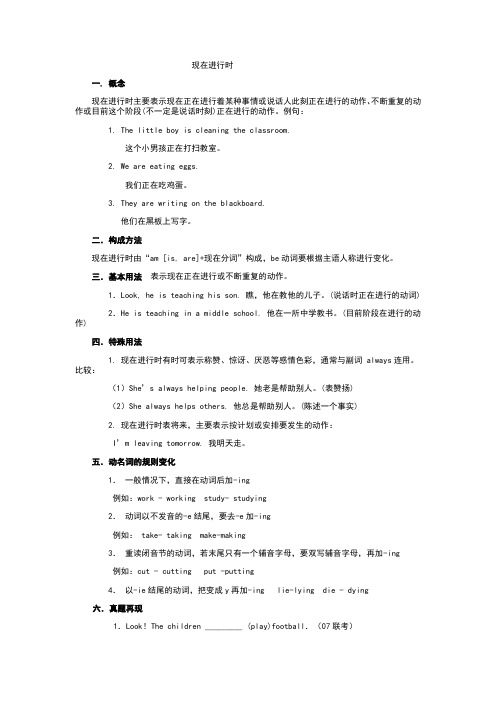
现在进行时一. 概念现在进行时主要表示现在正在进行着某种事情或说话人此刻正在进行的动作、不断重复的动作或目前这个阶段(不一定是说话时刻)正在进行的动作。
例句:1. The little boy is cleaning the classroom.这个小男孩正在打扫教室。
2. We are eating eggs.我们正在吃鸡蛋。
3. They are writing on the blackboard.他们在黑板上写字。
二.构成方法现在进行时由“am [is, are]+现在分词”构成,be动词要根据主语人称进行变化。
三.基本用法表示现在正在进行或不断重复的动作。
1.Look, he is teaching his son. 瞧,他在教他的儿子。
(说话时正在进行的动词) 2.He is teaching in a middle school. 他在一所中学教书。
(目前阶段在进行的动作)四.特殊用法1. 现在进行时有时可表示称赞、惊讶、厌恶等感情色彩,通常与副词 always连用。
比较:(1)She’s always helping people. 她老是帮助别人。
(表赞扬)(2)She always helps others. 他总是帮助别人。
(陈述一个事实)2. 现在进行时表将来,主要表示按计划或安排要发生的动作:I’m leaving tomorrow. 我明天走。
五.动名词的规则变化1.一般情况下,直接在动词后加-ing例如:work - working study- studying2.动词以不发音的-e结尾,要去-e加-ing例如: take- taking make-making3.重读闭音节的动词,若末尾只有一个辅音字母,要双写辅音字母,再加-ing例如:cut - cutting put -putting4.以-ie结尾的动词,把变成y再加-ing lie-lying die - dying 六.真题再现1.Look!The children _________ (play)football.(07联考)2.Look! The baby panda _________ (get) down from the tree.(08联考)若句中出现look, listen等词,说明此动作正在发生或进行,一般情况下用现在进行时态,所以正确答案分别为: playing gettingare you _________, Andy ---Mum. (10联考)A. waitB. waitingC. waiting forD. wait for根据现在进行时的构成可排除A和 D选项,本题考查wait for+等候的对象这一用法,故选C.精点精练一、用动词的正确形式填空。
小升初英语时态综合总复习训练题附参考答案及解析
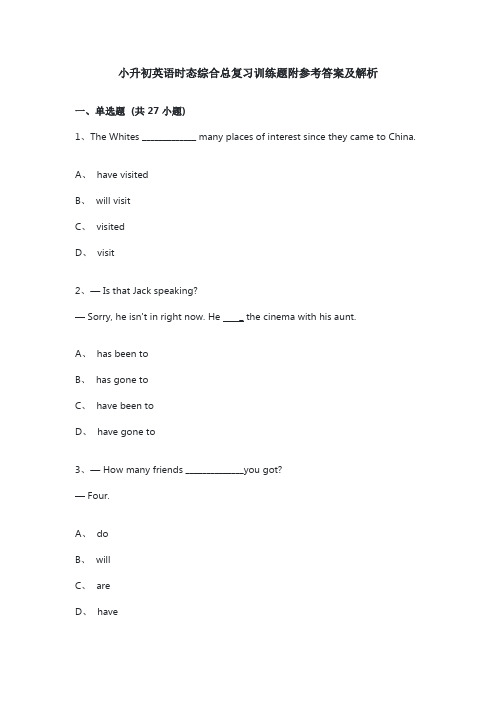
小升初英语时态综合总复习训练题附参考答案及解析一、单选题(共 27 小题)1、The Whites _____________ many places of interest since they came to China.A、have visitedB、will visitC、visitedD、visit2、— Is that Jack speaking?— Sorry, he isn't in right now. He _ the cinema with his aunt.A、has been toB、has gone toC、have been toD、have gone to3、— How many friends ______________you got?— Four.A、doB、willC、areD、have4、--What if you don't finish your work on time? -- Mrs. Brown will be very angry.A、happensB、is happenedC、happenedD、will happen5、Some people were _________ the river in a boat.A、 crossedB、 crossingC、 crosingD、 crosses6、He ________ cereal for breakfast yesterday.( )A、haveB、ateC、makes7、I _____ my hat yesterday.( )A、forgetB、forgotC、to forget8、Long ago, a little baby ____ born. ( )A、wereB、wasC、is9、Yesterday we ____ a lot of Christmas gifts.( )A、buyB、boughtC、buying10、A woman ________ to the store and ________ a dress.( )A、went; buyB、goes; buyC、went; boughtD、go; buy11、Jenny ____ cereal for breakfast yesterday. ( )A、ateB、eatC、eating12、Santa ____ them gifts yesterday. ( )B、broughtC、to bring13、He ____ people to love each other. ( )A、taughtB、teachC、teaching14、Yesterday we ____ gifts,( )A、boughtB、buyC、to buy15、I _______ home to China next week.A、flyB、will flyC、fly toD、fly for16、I ______________ go to the market (市场) to buy some fruit. ( )A、amB、isD、will17、I ____ 12 years old next year.( )A、amB、will beC、wasD、is18、Uncle Li ____ learn English next year.( )A、isB、going toC、is goD、is going to19、What are you going to _____________next week? ( )A、doB、didC、doesD、doing20、Jenny ____ cereal for breakfast yesterday.( )A、eatB、ateC、eats21、Kim ____ her father wash the dishes.( )A、helpB、helpsC、help to22、She ____ to learn English. ( )A、wantB、wantesC、wants23、It ____ her name on it!( )A、hasB、haveC、haven't24、They are ____ the newspaper.( )A、readB、to readC、reading25、She is _____ home now.A、going toB、go toC、going26、Mum is _____ eggs.A、cookB、cookingC、to cook27、Are they _____ cards? ( )A、playsB、playingC、played二、填空题(共 3 小题)1、用所给单词的适当形式填空。
2019年六年级小升初英语《时态》讲解与练习巩固
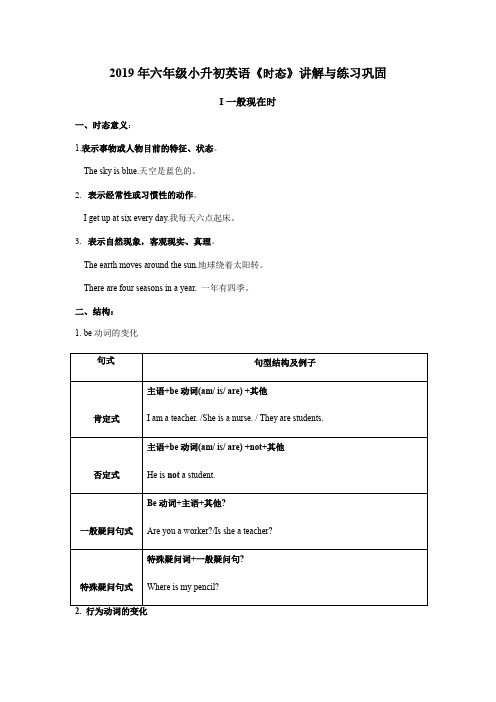
2019年六年级小升初英语《时态》讲解与练习巩固I一般现在时一、时态意义:1.表示事物或人物目前的特征、状态。
The sky is blue.天空是蓝色的。
2.表示经常性或习惯性的动作。
I get up at six every day.我每天六点起床。
3.表示自然现象,客观现实、真理。
The earth moves around the sun.地球绕着太阳转。
There are four seasons in a year. 一年有四季。
二、结构:1. be动词的变化三.常用的时间词语和短语:every day(week, month, year), every Monday (Tuesday...), always, often, usually, sometimes, never, at the weekends, on Sundays等…II现在进行时一、时态意义:现在进行时表示现在正在进行或发生的动作,也可表示当前一段时间内的活动或现阶段正在进行的动作。
1.The Greens are eating lunch now.2.Look! The cat is catching a mouse!3.Now I am reading the book Harry Porter.三、结构:现在进行时的句型结构及举例:三、常用的时间词语和短语:now, look, listen, this evening (Saturday, weekend...)these days, at this moment等…III 一般将来时一、时态意义:表示将要发生的动作或存在的状态及打算、计划或准备做某事。
1.I am going to read a book this evening./ I will read a book this evening.2.My father is going to buy some food in the supermarket tomorrow./ My father will buy ....3.We are going to spend five days in Sanya this summer holiday./ We will spend five days...二、一般将来时的句型结构及举例:next week(month, year, Sunday...), the day after tomorrow, tomorrow, on the weekend, after school, soon(很快), in two days(twenty years...), tonight(今晚), in the future等…IV一般过去时一、时态意义:表示过去某个时间发生的动作或存在的状态,常和表示过去的时间状语连用。
小升初英语时态专项复习及答案
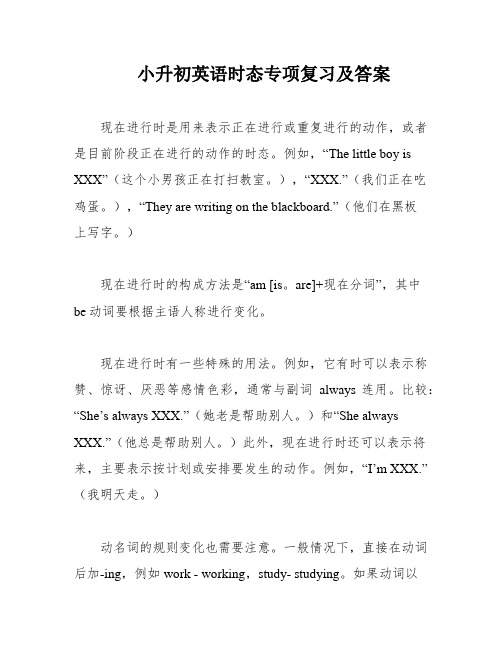
小升初英语时态专项复习及答案现在进行时是用来表示正在进行或重复进行的动作,或者是目前阶段正在进行的动作的时态。
例如,“The little boy is XXX”(这个小男孩正在打扫教室。
),“XXX.”(我们正在吃鸡蛋。
),“They are writing on the blackboard.”(他们在黑板上写字。
)现在进行时的构成方法是“am [is。
are]+现在分词”,其中be动词要根据主语人称进行变化。
现在进行时有一些特殊的用法。
例如,它有时可以表示称赞、惊讶、厌恶等感情色彩,通常与副词always连用。
比较:“She’s always XXX.”(她老是帮助别人。
)和“She always XXX.”(他总是帮助别人。
)此外,现在进行时还可以表示将来,主要表示按计划或安排要发生的动作。
例如,“I’m XXX.”(我明天走。
)动名词的规则变化也需要注意。
一般情况下,直接在动词后加-ing,例如work - working,study- studying。
如果动词以不发音的-e结尾,要去-e加-ing,例如take- taking,make-making。
对于重读闭音节的动词,若末尾只有一个辅音字母,要双写辅音字母,再加-ing,例如cut - cutting,put -putting。
以-ie结尾的动词要把变成y再加-ing,例如lie-lying,die - dying。
现在进行时的真题再现包括“Look!XXX XXX.”(瞧,孩子们正在踢足球。
)和“Look。
XXX XXX down from the tree.”(瞧,小熊猫正在从树上下来。
)1.XXX is XXX.2.I am watching TV right now.3.She is working in a hospital.4.Kitty and Ben are having XXX XXX.5.His father is able to help them.6."Danny。
2019年小升初英语基础时态专项训练题及答案

2019年小升初英语基础时态专项训练题及答案2019年小升初英语基础时态专项训练题及答案一、一般现在时练习题(1)1. We often___________(play) in the playgound.2. He _________(get) up at six o’clock.3. __________you _________(brush) your teeth every morning?4. What (do) he usually (do) after school?5. Danny (study) English,Chinese,Maths,Science and Art at school.6. Mike sometimes __________(go) to the park with his sister.7. At eight at night, she __________(watch) TV with his parents.8. ________ Mike________(read) English every day?9. How many lessons_________your classmate________(have) on Monday?10. What time_________his mother_________(do) the housework?改句子1. Do you often play football after school? (肯定回答)2. I have many books. (改为否定句)3. Gao Shan’s sister likes playing table tennis (改为否定句)4. She lives in a small town near New York. (改为一般疑问句)5. I watch TV every day. (改为一般疑问句)6. David has a goal. (改为一般疑问句)7. We have four lessons.(否定句)8. Nancy doesn’t run fast (肯定句)9. My dog runs fast.否定句:一般疑问句:10. Mike has two letters for him.一般疑问句:否定句:11. I usually play football on Friday afternoon.一般疑问句:否定句:一般现在时练习(2)1. He often (have) dinner at home.2. Daniel and Tommy (be) in Class One.3. We (not watch) TV on Monday.4. Nick (not go) to the zoo on Sunday.5. they (like) the World Cup?6. What they often (do) on Saturdays?7. your parents (read) newspapers every day?8. The girl (teach) us English on Sundays.9. She and I (take) a walk together every evening.10. There (be) some water in the bottle.二、现在进行时练习1、I _______________________( look for) a shirt, I’m looking fora tie.2、They ______________________( plant) flowers in the yard now.3、Miss Baker _________________( drink) milk in the cafeteria now.4、What are you _________(do) now? I ___________(eat) bread.5、It’s nine o’clock. My father_______________(work) in the office.6、Look, the boy____________(put) the rubbish into the bin.7、__________he__________(clean) the classroom? No, he isn’t. He____________(play).8、Where is Mak? He___________(run) on the grass.9、Listen, who____________(sing) in the music room? Oh,Mary_____________(sing) there.10、Who_______(sing)a song? ----Li Ying is.现在进行时练习(2)1、写出下例动词的现在分词形式1)give____ 2)use____ 3)clean____ 4)skate____ 5)draw____ 6)tell____ 7)do____ 8)write____ 9)get____ 10)put____ 11)take____ 12)stop____ 13)speak____ 14)swim____ 15)come____ 16)lie____ 17)die____ 18)cook____ 19)fly____ 20)help____ 21)close____ 22)see____ 23)run____2、用现在进行时连写句子1)Li Ping;learn;to;speak;English;____________________________________________________________it;rain;now____________________________________________________________3)they;watch;a football match;on TV____________________________________________________________he;look;out of the window;____________________________________________________________look;the dog;sleep;____________________________________________________________listen;the boy;talk;____________________________________________________________they;have lunch;at seven o'clock____________________________________________________________ the students;write;homework;now;____________________________________________________________ 3、将下例句子改成一般疑问句1)Mike is climbing the hill。
小升初英语四大时态复习讲解及真题专项练习含答案

小升初英语四大时态复习讲解及真题专项练习含答案一、重点讲解考点一:动词的基本形式1.动词原形(分实义动词、助动词、系动词、情态动词4类)(1)助动词(do/does/did)紧随其后的动词用原形;(2)情态动词(can/could/should/must/would/will/shall/maybe)紧随其后的动词用原形;(3)祈使句(表示命令式的语句)用原形;Eg: Open the door, please.(4)固定搭配。
let sb do sth/help sb do sth/make sb do sth/why not do sth.2.第三人称单数(用于一般现在时)变形规则:(1)一般在动词词尾加s。
如: work→works、read→reads、look →looks、live→lives。
(2)以ch、sh、s、x结尾的,在词尾加es。
如: catch→catches、finish→finishes、guess→guesses、。
(3)以o结尾的动词,分2种情况:有生命的加es,如:hero,tomato,potato;没有生命的加s,如:radio,photo。
(4)以辅音字母加y结尾的动词,变y为ies。
如: fly→flies、study →studies、carry→carries.(5) 不规则变化。
如: have→has ,are→is,were→was3.现在分词(用于现在进行时)变形规则:(1)一般在动词后加ing。
如: work→working、read→reading、look →looking、wait→waiting。
(2)以不发音的e结尾的动词,去掉e,再加ing。
如: smile→smiling、move→moving、take→taking、write→writing。
(3)以重读闭音节结尾的且词尾只有一个辅音字母的,双写这个辅音字母加ing。
如: sit→sitting、stop→stopping、cut→cutting、run →running、swim→swimming.(4)少数几个以ie结尾的动词,将ie改为y加ing。
2019最新小升初英语基础时态专项训练题及答案
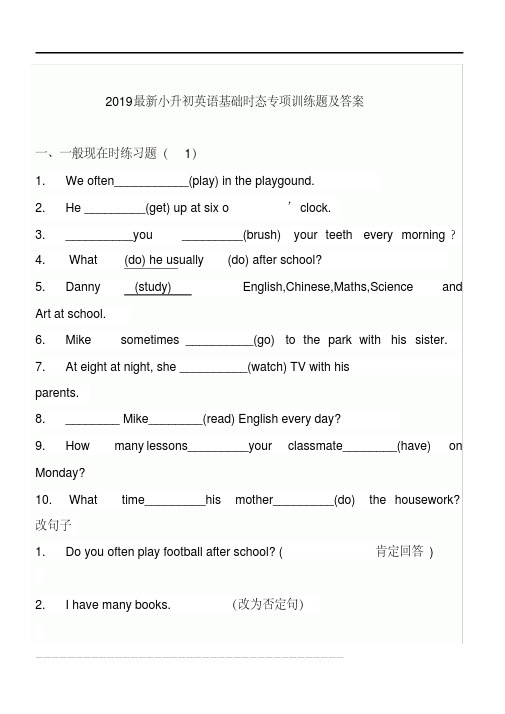
2019最新小升初英语基础时态专项训练题及答案一、一般现在时练习题(1)1. We often___________(play) in the playgound.2. He _________(get) up at six o’clock.3. __________you _________(brush) your teeth every morning?4. What (do) he usually (do) after school?5. Danny (study) English,Chinese,Maths,Science and Art at school.6. Mike sometimes __________(go) to the park with his sister.7. At eight at night, she __________(watch) TV with hisparents.8. ________ Mike________(read) English every day?9. How many lessons_________your classmate________(have) on Monday?10. What time_________his mother_________(do) the housework? 改句子1. Do you often play football after school? (肯定回答)2. I have many books. (改为否定句)3. Gao Shan’s sister likes playing table tennis (改为否定句)4. She lives in a small town near New York. (改为一般疑问句)5. I watch TV every day. (改为一般疑问句)6. David has a goal. (改为一般疑问句)7. We have four lessons.(否定句)8. Nancy doesn’t run fast (肯定句)9. My dog runs fast.否定句:一般疑问句:10. Mike has two letters for him.一般疑问句:否定句:11. I usually play football on Friday afternoon.一般疑问句:否定句:一般现在时练习(2)1. He often (have) dinner at home.2. Daniel and Tommy (be) in Class One.3. We (not watch) TV on Monday.4. Nick (not go) to the zoo on Sunday.5. they (like) the World Cup?6. What they often (do) on Saturdays?7. your parents (read) newspapers every day?8. The girl (teach) us English on Sundays.9. She and I (take) a walk together every evening.10. There (be) some water in the bottle.二、现在进行时练习1、I _______________________( look for) a shirt, I’m looking fora tie.2、They ______________________( plant) flowers in the yard now.3、Miss Baker _________________( drink) milk in the cafeteria now.4、What are you _________(do) now? I ___________(eat) bread.5、It’s nine o’clock. My father_______________(work) in the office.6、Look, the boy____________(put) the rubbish into the bin.7、__________he__________(clean) the classroom? No, he isn’t.He____________(play).8、Where is Mak? He___________(run) on the grass.9、Listen, who____________(sing) in the music room? Oh, Mary_____________(sing) there.10、Who_______(sing)a song? ----Li Ying is.现在进行时练习(2)1、写出下例动词的现在分词形式1)give____ 2)use____ 3)clean____ 4)skate____ 5)draw____ 6)tell____ 7)do____ 8)write____ 9)get____ 10)put____ 11)take____ 12)stop____ 13)speak____ 14)swim____ 15)come____ 16)lie____ 17)die____18)cook____ 19)fly____ 20)help____ 21)close____ 22)see____ 23)run____2、用现在进行时连写句子1)Li Ping;learn;to;speak;English;____________________________________________________________ it;rain;now____________________________________________________________ 3)they;watch;a football match;on TV____________________________________________________________ he;look;out of the window;____________________________________________________________ look;the dog;sleep;____________________________________________________________ listen;the boy;talk;____________________________________________________________ they;have lunch;at seven o'clock____________________________________________________________ the students;write;homework;now;____________________________________________________________ 3、将下例句子改成一般疑问句1)Mike is climbing the hill。
- 1、下载文档前请自行甄别文档内容的完整性,平台不提供额外的编辑、内容补充、找答案等附加服务。
- 2、"仅部分预览"的文档,不可在线预览部分如存在完整性等问题,可反馈申请退款(可完整预览的文档不适用该条件!)。
- 3、如文档侵犯您的权益,请联系客服反馈,我们会尽快为您处理(人工客服工作时间:9:00-18:30)。
【点评】本题考查了一般现在时,注意主谓一致。
8.【答案】is going/will go;goes
9.My father ________(like)________(play) basketball.
答案解析部分
1.【答案】watches
【考点】动词,一般现在时
【解析】【分析】句意:我父亲每天看电视。由“every day每天”得知该句子是一般现在时,主语father是第三人称单数,谓语动词也用第三人称单数形式,ch结尾的动词过去式需要加es,故答案为watches。
2)当谓语是行为动词时,一般现在时的构成:
①主语(非第三人称单数)+动词原形+其他
如: I oftenwatchTV at the weekends. Mr. Green and Mrs. Greenlikecollecting stamps.
②主语(第三人称单数)+动词的第三人称单数形式(V.+s/es)+其他
--Didtheyplaygames just now?
--Yes, theydid./No, theydidn’t.
【考点】一般现在时,一般将来时
【解析】【分析】句意:汤姆第二天......植树。他每年都.....植树。next day第二天,是一般将来时的时间状语,构成be going to/will+动词原形,every year每年,是一般现在时的时间状语,谓语用三单形式,go去,三单形式是goes,故答案为is going/will go,goes.
3.They like ________(play)football after school .
4.Li Tao usually ________(run)in the park .
5.My sister ________(study) English every week.
6.I ________ (walk) to school every day.
【点评】本题考查了一般现在时,主谓一致。
一般过去时(知识梳理+真题+练习)
知识梳理
1、定义:表示过去某个时间里发生的动作或存在的状态,也可以表示过去经常发生或反复发生的动作,常和表示过去的时间状语连用,如:yesterday, last year, just now(刚才), two days ago, in 1990等。I went to bed at eleven last night.昨晚我11:00睡觉。
④不规则变化。如:have-has
四、一般现在时的句型转换:
肯定句
否定句
一般疑问句及回答
TheywatchTV every day.
Theydon’twatchTV every day.
--DotheywatchTV every day?
--Yes, they do./No, they don’t.
解析:always(总是)用于一般现在时的句子中,主语he为第三人称单数,谓语应为have的第三人称单数形式has,故选B。
3.She is studyingEnglishwith her classmates.(用often改写)(大连市某中学招生真题)
She__________ __________Englishwith her classmates.
They can jump.他们会跳。
三、动词第三人称单数形式(V. + s/es)的变化规则:
①一般情况下,直接加s.如:like-likes,read-reads,visit-visits,play-plays,want-wants,work-works,know-knows,help-helps,get-gets.
【点评】本题主要考查一般现在时的第三人称单数,注意规则动词三单式的变化规则。
6.【答案】walk
【考点】动词,一般现在时
【解析】【分析】句意:我每天走路去上学。该句子是一般现在时,主语I是第一人称,谓语动词用原形,故答案为walk。
【点评】考查一般现在时的第一人称单数。
7.【答案】does
【考点】一般现在时
如:Jim usually visits his grandparents on Sundays.
She sometimes goes to the park with her mother.
3)当谓语动词是情态动词can时,can没有人称和数的变化,后面接动词原形。如:
I can play football.我会踢足球。It can run very fast.他跑的很快。
④以一个辅音字母结尾的重读闭音节动词,先写这个辅音字母,在加ed
如:stop–stopped, plan–planned,trip-tripped.
⑤不规则变化,如:
a.以t结尾的词,过去式与原形相同.
例:put→put let→let cut→cut beat→beat
b.以d结尾的词,把d变成t.
2、构成:主语+动词的过去式+其他
Iwasten years old last year
Marywentto school yesterday.
3、动词过去式的变化规则:
①一般动词在原形末尾加ed
如:play–played, listen–listened, look–looked,want-wanted,work-worked,need-needed,clean-cleaned.
3.【答案】playing
【考点】动词,一般现在时
【解析】【分析】句意:他们喜欢放学后踢足球。like doing sth(喜欢干某事)是固定用法,故答案分为playing。
【点评】本题主要考查like doing sth(喜欢干某事)固定用法,记住动词现在分词的构成规则。
4.【答案】runs
【考点】动词,一般现在时
②以s,x,ch,sh,o结尾,加es .如:wash-washes,watch-watches,go-goes, do-does, teach-teaches, pass-passes, guess-guesses.
③以辅音字母+ y结尾,变y为i,再加es.如:study-studies, fly-flies, carry-carries, worry-worries.
例:build→built lend→lent send→sent spend→spent
c.以n结尾的词,在词后加t.
例:mean→meant burn→burnt learn→learnt
d.以ow / aw结尾的词,把ow / aw变成ew.
例:blow→blew draw→drew know→knew grow→grew
规则动词词尾加-ed有三种读音:
a.在清辅音后读作[t].如:asked helped watched stopped
b在浊辅音和元音后读作[d].如:enjoyed studied moved called
c.在t / d后读作[id].如:wanted needed
4、一般过般现在时的句子中,主语she为第三人称单数,谓语应为study的第三人称单数形式studies,故选填often studies.
习题练习
1.My father________(watch)TV every day .
2.Tom's leg ________ (hurt) .
【解析】【分析】句意:李涛通常在公园里跑步。该句子是一般现在时,主语Li Tao是第三人称单数,谓语动词也用第三人称单数形式,故答案为runs。
【点评】考查一般现在时的第三人称单数,注意规则动词三单式的变化规则。
5.【答案】studies
【考点】动词,一般现在时
【解析】【分析】句意:我姐姐每周学英语。由“every day每天”得知该句子是一般现在时,主语sister是第三人称单数,谓语动词也用第三人称单数形式,,故答案为studies。
e.含有双写字母的词,将双写改为单写,在词尾加t.
例:keep→kept sleep→slept feel→felt smell→smelt
f .含有元音字母o / i的词,将o / i变成a.
例:sing→sang give→gave sit→sat drink→drank
g.一些常见的转换
例:do→did don`t→didn`t is→was are→were
ShewatchesTV every day.
Shedoesn’twatchTV every day.
--DoesshewatchTV every day?
--Yes, theydoes./No,theydoesn’t.
名校真题体验
1.Mr Green ____around.(山东省济南市某重点中学入学试题)
②以e结尾的动词,直接加d
如:live–lived, like–liked, taste–tasted,use-used,move-moved.
③以辅音字母+y结尾的动词,先变y为i,再加ed
如:study–studied, carry–carried, cry–cried,hurry-hurried,marry-married.
一般现在时(知识梳理+真题+练习)
知识梳理
一、定义:表示经常或习惯性的动作,也可表示现在的状态或主语具备的性格和能力,常与表示频率的副词连用,如,always总是,,usually通常,often经常,sometimes有时,never从不,every day每天,at weekends, on Sundays.
